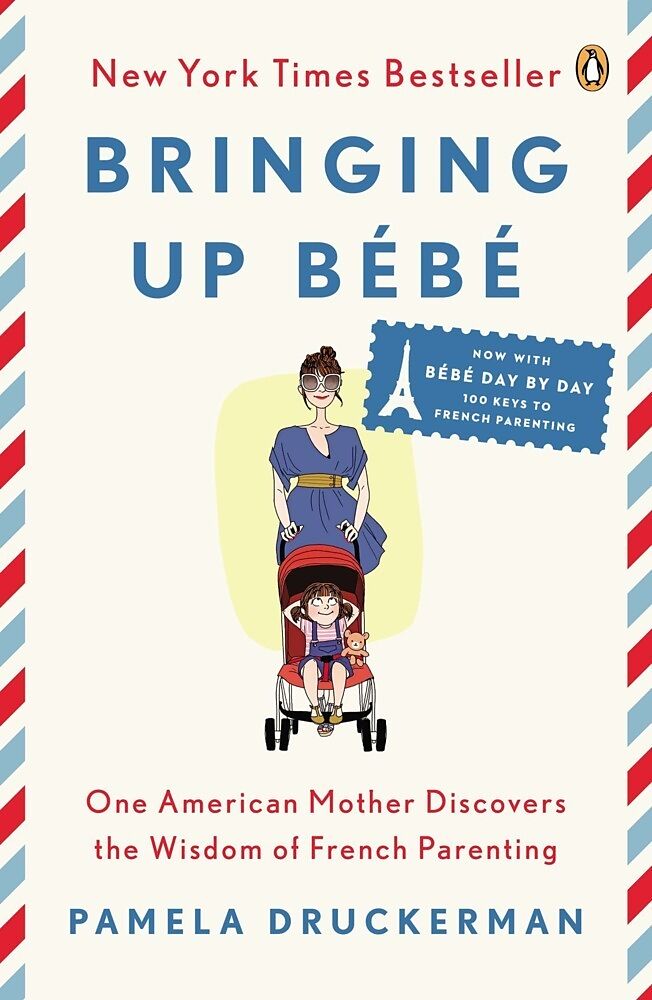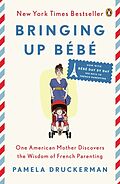

Bringing Up Bébé
Beschreibung
When American journalist Pamela Druckerman had a baby in Paris, she didnt aspire to become a French parent. French parenting wasnt a known thing, like French fashion, or French cheese. Even French parents themselves insisted they werent doing anything special....Format auswählen
- Kartonierter EinbandCHF 20.30
Wird oft zusammen gekauft
Andere Kunden kauften auch
Beschreibung
When American journalist Pamela Druckerman had a baby in Paris, she didnt aspire to become a French parent. French parenting wasnt a known thing, like French fashion, or French cheese. Even French parents themselves insisted they werent doing anything special.
Zusatztext Marvelous . . . Like Julia Child, who translated the secrets of French cuisine, Druckerman has investigated and distilled the essentials of French child-rearing. . . . Druckerman provides fascinating details about French sleep training, feeding schedules and family rituals. But her book's real pleasures spring from her funny, self-deprecating stories. Like the principles she examines, Druckerman isn't doctrinaire. NPR Bringing Up Bébé is a must-read for parents who would like their children to eat more than white pasta and chicken fingers. Fox News On questions of how to live, the French never disappoint. . . . Maybe it all starts with childhood. That is the conclusion that readers may draw from Bringing Up Bébé . The Wall Street Journal French women don't have little bags of emergency Cheerios spilling all over their Louis Vuitton handbags. They also, Druckerman notes, wear skinny jeans instead of sweatpants. The world arguably needs more kids who don't throw food. Chicago Tribune I've been a parent now for more than eight years, andconfessionI've never actually made it all the way through a parenting book. But I found Bringing Up Bébé to be irresistible. Slate Informationen zum Autor Pamela Druckerman is a journalist and the author of five books including Bringing Up Bébé , which has been translated into 31 languages and optioned as a feature film. She wrote the Dress Code column for 1843/The Economist and a monthly column about France for The New York Times , where she won an Emmy and an Overseas Press Club award. Her work has also appeared in The Atlantic , Harper's , The New York Review of Books , and The Wall Street Journal . Her most recent book is There Are No Grown-Ups: A Midlife Coming-of-Age Story . Klappentext The runaway New York Times bestseller that shows American parents the secrets behind France's amazingly well-behaved children, from the author of There Are No Grown-ups. When American journalist Pamela Druckerman had a baby in Paris, she didn't aspire to become a "French parent." But she noticed that French children slept through the night by two or three months old. They ate braised leeks. They played by themselves while their parents sipped coffee. And yet French kids were still boisterous, curious, and creative. Why? How? With a notebook stashed in her diaper bag, Druckerman set out to investigate-and wound up sparking a national debate on parenting. Researched over three years and written in her warm, funny voice, Bringing Up Bébé is deeply wise, charmingly told, and destined to become a classic resource for American parents. french children don't throw food When my daughter is eighteen months old, my husband and I decide to take her on a little summer holiday. We pick a coastal town that's a few hours by train from Paris, where we've been living (I'm American, he's British), and we book a hotel room with a crib. She's our only child at this point, so forgive us for thinking: How hard could it be? We have breakfast at the hotel. But we have to eat lunch and dinner at the little seafood restaurants around the old port. We quickly discover that two restaurant meals a day, with a toddler, deserve to be their own circle of hell. Bean is briefly interested in food: a piece of bread or anything fried. But within a few minutes she starts spilling salt shakers and tearing apart sugar packets. Then she demands to be sprung from her high chair so she can dash around the restaurant and bolt dangerously toward the docks. Our strategy is to finish the meal quickly. We order while we're being seated, then we beg the server to rush out some bread and bring us all our food, appetizers and main courses, simultaneously. While my husband has a few bites...
Autorentext
Pamela Druckerman is a journalist and the author of five books including Bringing Up Bébé, which has been translated into 31 languages and optioned as a feature film. She wrote the Dress Code column for 1843/The Economist and a monthly column about France for The New York Times, where she won an Emmy and an Overseas Press Club award. Her work has also appeared in The Atlantic, Harper’s, The New York Review of Books, and The Wall Street Journal. Her most recent book is There Are No Grown-Ups: A Midlife Coming-of-Age Story.
Klappentext
The runaway New York Times bestseller that shows American parents the secrets behind France's amazingly well-behaved children, from the author of There Are No Grown-ups. When American journalist Pamela Druckerman had a baby in Paris, she didn't aspire to become a "French parent." But she noticed that French children slept through the night by two or three months old. They ate braised leeks. They played by themselves while their parents sipped coffee. And yet French kids were still boisterous, curious, and creative. Why? How?
With a notebook stashed in her diaper bag, Druckerman set out to investigate-and wound up sparking a national debate on parenting. Researched over three years and written in her warm, funny voice, Bringing Up Bébé is deeply wise, charmingly told, and destined to become a classic resource for American parents.
Zusammenfassung
*The runaway New York Times* bestseller that shows American parents the secrets behind France's amazingly well-behaved children.
 
This edition also includes Bébé Day by Day: 100 Keys to French Parenting*
“On questions of how to live, the French never disappoint. . . . Maybe it all starts with childhood. That is the conclusion that readers may draw from Bringing Up Bébé.” —*The Wall Street Journal
-
“I’ve been a parent now for more than eight years, and—confession—I’ve never actually made it all the way through a parenting book. But I found Bringing Up Bébé to be irresistible.” —Slate**
When American journalist Pamela Druckerman had a baby in Paris, she didn't aspire to become a “French parent.” But she noticed that French children slept through the night by two or three months old. They ate braised leeks. They played by themselves while their parents sipped coffee. And yet French kids were still boisterous, curious, and creative. Why? How?
With a notebook stashed in her diaper bag, Druckerman set out to investigate—and wound up sparking a national debate on parenting. Researched over three years and written in her warm, funny voice, Bringing Up Bébé is deeply wise, charmingly told, and destined to become a classic resource for American parents.
Leseprobe
french children don’t throw food
When my daughter is eighteen months old, my husband and I decide to take her on a little summer holiday. We pick a coastal town that’s a few hours by train from Paris, where we’ve been living (I’m American, he’s British), and we book a hotel room with a crib. She’s our only child at this point, so forgive us for thinking: How hard could it be?
We have breakfast at the hotel. But we have to eat lunch and dinner at the little seafood restaurants around the old port. We quickly discover that two restaurant meals a day, with a toddler, deserve to be their own circle of hell. Bean is briefly interested in food: a piece of bread or anything fried. But within a few minutes she starts spilling salt shakers and tearing apart sugar packets. Then she demands to be sprung from her high chair so she can dash around the restaurant and bolt dangerously toward the docks.
Our strategy is to finish the meal quickly. We order while we’re …